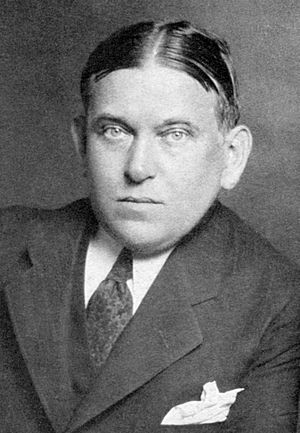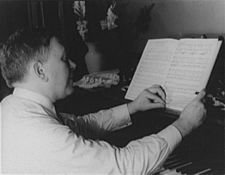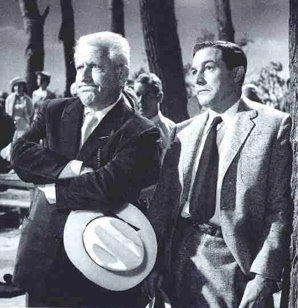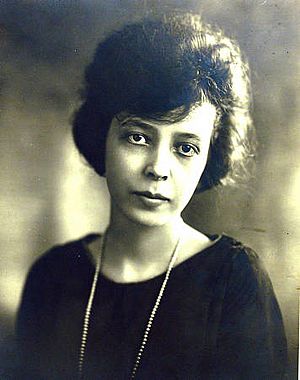H. L. Mencken facts for kids
Quick facts for kids
H. L. Mencken
|
|
|---|---|

Mencken in 1928
|
|
| Born |
Henry Louis Mencken
September 12, 1880 |
| Died | January 29, 1956 (aged 75) Baltimore, Maryland, U.S.
|
| Occupation | |
|
Notable credit(s)
|
The Baltimore Sun |
| Spouse(s) |
Sara Haardt
(m. 1930; died 1935) |
| Parent(s) | August Mencken Sr. |
| Relatives | August Mencken Jr. (brother) |
Henry Louis Mencken (September 12, 1880 – January 29, 1956) was an American journalist, essayist, satirist, cultural critic, and scholar of American English. He commented widely on the social scene, literature, music, prominent politicians, and contemporary movements.
His longtime home in the Union Square neighborhood of West Baltimore was turned into a city museum, the H. L. Mencken House. His papers were distributed among various city and university libraries, with the largest collection held in the Mencken Room at the central branch of Baltimore's Enoch Pratt Free Library.
Contents
Early life
Mencken was born in Baltimore, Maryland, on September 12, 1880. He was the son of Anna Margaret (Abhau) and August Mencken Sr., a cigar factory owner. He was of German ancestry and spoke German in his childhood. When Henry was three, his family moved into a new home at 1524 Hollins Street facing Union Square park in the Union Square neighborhood of old West Baltimore. Apart from five years of married life, Mencken was to live in that house for the rest of his life.
In his bestselling memoir Happy Days, he described his childhood in Baltimore as "placid, secure, uneventful and happy."
When he was nine years old, he read Mark Twain's Huckleberry Finn, which he later described as "the most stupendous event in my life." He became determined to become a writer and read voraciously. In one winter while in high school he read William Makepeace Thackeray and then "proceeded backward to Addison, Steele, Pope, Swift, Johnson and the other magnificos of the Eighteenth century." He read the entire canon of Shakespeare and became an ardent fan of Rudyard Kipling and Thomas Huxley. As a boy, Mencken also had practical interests, photography and chemistry in particular, and eventually had a home chemistry laboratory in which he performed experiments of his own design, some of them inadvertently dangerous.
He began his primary education in the mid-1880s at Professor Knapp's School on the east side of Holliday Street between East Lexington and Fayette Streets, next to the Holliday Street Theatre and across from the newly constructed Baltimore City Hall. The site today is the War Memorial and City Hall Plaza laid out in 1926 in memory of World War I dead. At 15, in June 1896, he graduated as valedictorian from the Baltimore Polytechnic Institute, at the time a males-only mathematics, technical and science-oriented public high school.
He worked for three years in his father's cigar factory. He disliked the work, especially the sales aspect of it, and resolved to leave, with or without his father's blessing. In early 1898 he took a writing class at the Cosmopolitan University, a free correspondence school. This was to be the entirety of Mencken's formal education in journalism, or in any other subject. Upon his father's death a few days after Christmas in the same year, the business passed to his uncle, and Mencken was free to pursue his career in journalism. He applied in February 1899 to the Morning Herald newspaper (which became the Baltimore Morning Herald in 1900) and was hired part-time, but still kept his position at the factory for a few months. In June he was hired as a full-time reporter.
Career
Mencken served as a reporter at the Herald for six years. Less than two-and-a-half years after the Great Baltimore Fire, the paper was purchased in June 1906 by Charles H. Grasty, the owner and editor of The News since 1892, and competing owner and publisher Gen. Felix Agnus, of the town's oldest (since 1773) and largest daily, The Baltimore American. They proceeded to divide the staff, assets and resources of The Herald between them. Mencken then moved to The Baltimore Sun, where he worked for Charles H. Grasty. He continued to contribute to The Sun, The Evening Sun (founded 1910) and The Sunday Sun full-time until 1948, when he stopped writing after suffering a stroke.
Mencken began writing the editorials and opinion pieces that made his name at The Sun. On the side, he wrote short stories, a novel, and even poetry, which he later revealed. In 1908, he became a literary critic for The Smart Set magazine, and in 1924 he and George Jean Nathan founded and edited The American Mercury, published by Alfred A. Knopf. It soon developed a national circulation and became highly influential on college campuses across America. In 1933, Mencken resigned as editor.
Personal life
Marriage
In 1930, Mencken married Sara Haardt, a German-American professor of English at Goucher College in Baltimore and an author eighteen years his junior. Haardt had led an unsuccessful effort in Alabama to ratify the 19th Amendment. The two met in 1923, after Mencken delivered a lecture at Goucher; a seven-year courtship ensued. The marriage made national headlines, and many were surprised that Mencken, who once called marriage "the end of hope" and who was well known for mocking relations between the sexes, had gone to the altar. "The Holy Spirit informed and inspired me," Mencken said. "Like all other infidels, I am superstitious and always follow hunches: this one seemed to be a superb one." Even more startling, he was marrying an Alabama native, despite his having written scathing essays about the American South. Haardt was in poor health from tuberculosis throughout their marriage and died in 1935 of meningitis, leaving Mencken grief-stricken. He had always championed her writing and, after her death, had a collection of her short stories published under the title Southern Album.
Great Depression, war, and afterward

During the Great Depression, Mencken did not support the New Deal, which cost him popularity, as did his strong reservations regarding U.S. participation in World War II, and his overt contempt for President Franklin D. Roosevelt. He ceased writing for The Baltimore Sun for several years, focusing on his memoirs and other projects as editor while he served as an adviser for the paper that had been his home for nearly his entire career. In 1948, he briefly returned to the political scene to cover the presidential election in which President Harry S. Truman faced Republican Thomas Dewey and Henry A. Wallace of the Progressive Party. His later work consisted of humorous, anecdotal, and nostalgic essays that were first published in The New Yorker and then collected in the books Happy Days, Newspaper Days, and Heathen Days.
Last years
On November 23, 1948, Mencken suffered a stroke, which left him aware and fully conscious but nearly unable to read or write and able to speak only with difficulty. After his stroke, Mencken enjoyed listening to classical music and, after some recovery of his ability to speak, talking with friends, but he sometimes referred to himself in the past tense, as if he were already dead. During the last year of his life, his friend and biographer William Manchester read to him daily.
Death
Mencken died in his sleep on January 29, 1956. He was interred in Baltimore's Loudon Park Cemetery.
Though it does not appear on his tombstone, Mencken, during his Smart Set days, wrote a joking epitaph for himself:
If, after I depart this vale, you ever remember me and have thought to please my ghost, forgive some sinner and wink your eye at some homely girl.
A very small, short, and private service was held, in accordance with Mencken's wishes.
Mencken was preoccupied with his legacy and kept his papers, letters, newspaper clippings, columns, and even grade school report cards. After his death, those materials were made available to scholars in stages in 1971, 1981, and 1991 and include hundreds of thousands of letters sent and received. The only omissions were strictly personal letters received from women.
Beliefs
In his capacity as editor, Mencken became close friends with the leading literary figures of his time, including Theodore Dreiser, F. Scott Fitzgerald, Joseph Hergesheimer, Anita Loos, Ben Hecht, Sinclair Lewis, James Branch Cabell, and Alfred Knopf, as well as a mentor to several young reporters, including Alistair Cooke. He also championed artists whose works he considered worthy. For example, he asserted that books such as Caught Short! A Saga of Wailing Wall Street (1929), by Eddie Cantor (ghostwritten by David Freedman) did more to pull America out of the Great Depression than all government measures combined. He also mentored John Fante. Thomas Hart Benton illustrated an edition of Mencken's book Europe After 8:15.
Mencken also published many works under various pseudonyms, including Owen Hatteras, John H Brownell, William Drayham, WLD Bell, and Charles Angoff. As a ghostwriter for the physician Leonard K. Hirshberg, he wrote a series of articles and, in 1910, most of a book about the care of babies.
Mencken admired the German philosopher Friedrich Nietzsche (he was the first writer to provide a scholarly analysis in English of Nietzsche's views and writings) and Joseph Conrad. His humor and satire owed much to Ambrose Bierce and Mark Twain. For Mencken, Adventures of Huckleberry Finn was the finest work of American literature.

Views
Race and elitism
In addition to his identification of races with castes, Mencken had views about the superior individual within communities. He believed that every community produced a few people of clear superiority. He considered groupings on a par with hierarchies, which led to a kind of natural elitism and natural aristocracy. "Superior" individuals, in Mencken's view, were those wrongly oppressed and disdained by their own communities, but nevertheless distinguished by their will and personal achievement, not by race or birth.
Larry S. Gibson argued that Mencken's views on race changed significantly between his early and later writings, attributing some of the changes in Mencken's views to his personal experiences of being treated as an outsider due to his German heritage during World War I.
Science and mathematics
Mencken defended the evolutionary views of Charles Darwin, but spoke unfavorably of many prominent physicists and had little regard for pure mathematics.
Mencken ridiculed Albert Einstein's theory of general relativity.
Memorials
Home
Mencken's home at 1524 Hollins Street in Baltimore's Union Square neighborhood, where he lived for 67 years before his death in 1956, was bequeathed to the University of Maryland, Baltimore on the death of his younger brother, August, in 1967. The City of Baltimore acquired the property in 1983, and the H. L. Mencken House became part of the City Life Museums. It has been closed to general admission since 1997, but is opened for special events and group visits by arrangement.
Papers
Shortly after World War II, Mencken expressed his intention of bequeathing his books and papers to Baltimore's Enoch Pratt Free Library. At his death, it was in possession of most of the present large collection. As a result, his papers as well as much of his personal library, which includes many books inscribed by major authors, are held in the Library's Central Branch on Cathedral Street in Baltimore. The original third floor H. L. Mencken Room and Collection housing this collection was dedicated on April 17, 1956. The new Mencken Room, on the first floor of the Library's Annex, was opened in November 2003.
The collection contains Mencken's typescripts, newspaper and magazine contributions, published books, family documents and memorabilia, clipping books, large collection of presentation volumes, file of correspondence with prominent Marylanders, and the extensive material he collected while he was preparing The American Language.
Other Mencken related collections of note are at Dartmouth College, Harvard University, Princeton University, Johns Hopkins University, and Yale University. In 2007, Johns Hopkins acquired "nearly 6,000 books, photographs and letters by and about Mencken" from "the estate of an Ohio accountant."
The Sara Haardt Mencken collection at Goucher College includes letters exchanged between Haardt and Mencken and condolences written after her death. Some of Mencken's vast literary correspondence is held at the New York Public Library. "Gift of HL Mencken 1929" is stamped on The Marriage of Heaven and Hell, Luce 1906 edition of William Blake, which shows up from the Library of Congress online version for reading. Mencken's letters to Louise (Lou) Wylie, a reporter and feature writer for New Orleans's The Times-Picayune newspaper, are archived at Loyola University New Orleans.
Works
Books
- George Bernard Shaw: His Plays (1905)
- The Philosophy of Friedrich Nietzsche (1907)
- The Gist of Nietzsche (1910)
- What You Ought to Know about your Baby (Ghostwriter for Leonard K. Hirshberg; 1910)
- Men versus the Man: a Correspondence between Robert Rives La Monte, Socialist and H. L. Mencken, Individualist (1910)
- Europe After 8:15 (1914)
- A Book of Burlesques (1916)
- A Little Book in C Major (1916)
- A Book of Prefaces (1917)
- In Defense of Women (1918)
- D***n! A Book of Calumny (1918)
- The American Language (1919)
- Prejudices (1919–27)
- First Series (1919)
- Second Series (1920)
- Third Series (1922)
- Fourth Series (1924)
- Fifth Series (1926)
- Sixth Series (1927)
- Selected Prejudices (1927)
- Heliogabalus (A Buffoonery in Three Acts) (1920)
- The American Credo (1920)
- Notes on Democracy (1926)
- Menckeneana: A Schimpflexikon (1928) – Editor
- Treatise on the Gods (1930)
- Making a President (1932)
- Treatise on Right and Wrong (1934)
- Happy Days, 1880–1892 (1940)
- Newspaper Days, 1899–1906 (1941)
- A New Dictionary of Quotations on Historical Principles from Ancient and Modern Sources (1942)
- Heathen Days, 1890–1936 (1943)
- Christmas Story (1944)
- The American Language, Supplement I (1945)
- The American Language, Supplement II (1948)
- A Mencken Chrestomathy (1949) (edited by H.L. Mencken)
See also
 In Spanish: H. L. Mencken para niños
In Spanish: H. L. Mencken para niños


